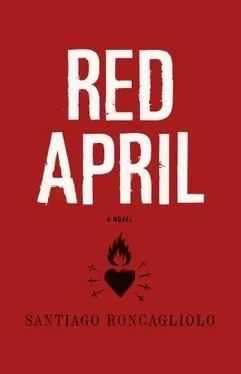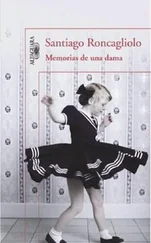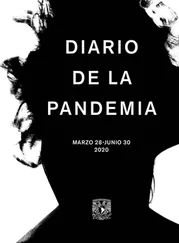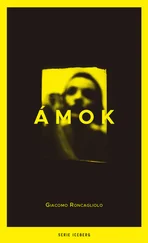“Father Quiroz?”
Now he heard it clearly. It was the sound of something dragging along the floor, like a deep hissing.
“Father? It's Félix Chacaltana.”
He found the switch and turned on the light. He was startled by the image of a man, but it was really a crucifix a meter high. The room was in the same disorder he had seen the last time. The heavy door to the basement was open. He went through the living room to the priest's bedroom. He opened the door, standing to one side. Since nothing came out, he turned on the light.
Here, by contrast, everything was in the most scrupulous order. There was only a worktable, a bureau, and a meticulously made bed with no wrinkles on the sheets. On the wall hung another crucifix, a very small one, which seemed to watch over the peace of the bedroom. He heard the hissing again outside, in the living room. Almost by instinct, he unsnapped the holster and took out the weapon. He returned to the living room pointing straight ahead, at the chests, and cocked the gun so the bullet would come out faster in case of an emergency. He realized his hand was trembling. He leaned his back against the wall and began to move that way around the perimeter of the room, edging past the chests where they stood, then taking out his handkerchief to wipe away perspiration. He was soaked. He reached the door to the basement and began to go down the stairs, still hugging the wall. He did not know where to aim the weapon. He opted to point down, where the darkness was most dense. He recognized the smell of incense and dampness, mixed with a chemical odor he could not identify.
When he reached the bottom of the stairs, he tried to remember where the switch was located. Since he had the weapon in his right hand, he felt up and down along the wall on the left with his free hand. All he found was the cold, mildewed wall. He moved the weapon into his other hand and repeated the operation on the right. There it was, fairly low on the wall. He turned it on. The flickering light suggested there was someone else in the room. He raised the weapon in his direction and shouted:
“Freeze, damn it! I'm armed!”
There was no reply. When the light stopped trembling, he could see more clearly. The body, in reality the half body coming out of the oven, was Father Quiroz. He was still wearing the vestments for Mass, his arms in gathered sleeves opened in a cross. Overcoming his revulsion, the prosecutor moved closer. Something emerged from the priest's mouth, like a rigid, very long tongue. When he was beside him, the prosecutor discovered that it was the hilt of a knife. The rest was inside, piercing the priest's throat to the nape of his neck. The blood flowing out of his mouth had not yet coagulated. It was still dripping on the damp floor of the basement and staining the edges of the oven. The death was very recent. Blood was not the only thing dripping. Before or after the execution, the killer had poured acid on the face and arms of the priest. The open bottles were still to one side. The body parts that had touched the liquid looked eaten away and liquefied, the skin creased and torn, transformed into a sticky gum of flesh. Inside the oven, the prosecutor saw that one leg had been separated from the trunk. He shuddered and moved back. The priest's face looked blindly at the basement ceiling, perhaps trying to see heaven, but for him heaven was underground.
The prosecutor heard a sound on the stairs. Despite the horror of what he had found, or perhaps precisely because of it, he reacted in time. He turned and fired. It was the first time in his life he had fired a gun. The shot sounded much louder than he expected and pushed him backward until he tripped over the body. The bullet rebounded against the walls, thundering through the house with sharp echoes as it crashed against stone. In a corner he saw the little window. He estimated that the couple outside were only a few meters away. They must have heard it. Perhaps they would call the police. He hoped to God they had. Now he clearly heard a metallic clink coming from the stairs. The sound was moving away. He supposed the killer did not have a firearm and was fleeing. He ran after him. He threw himself onto the stairs just in time to see the basement door close. Before he reached the top of the stairs he heard the key turning in the lock. He shouted. He banged on the door with all his strength. He kicked it. But the door did not move a millimeter.
Slowly he went downstairs again. Father Quiroz seemed to be waiting for him. His face gave the impression of a disillusioned grimace. The prosecutor decided to wait. The authorities would come, alerted by the gunshot. He could explain to them what had happened. Perhaps they would come in time to pursue the killer. Then he reconsidered: What could he explain to the authorities? What could he say to them? They would find him locked in with a corpse, carrying an unlicensed firearm, near all the instruments of the crime. Then he thought too that each of the last three victims had spoken to him shortly before dying. He tried to clear his head. No. He was innocent. That same afternoon he had requested protection for the city streets. His request had been denied. Protection for the streets. He had not mentioned the parish house. It might seem that he had requested protection precisely to provide himself with an alibi. Pacheco would be delighted to sign that investigation, and Judge Briceño would sentence him with the same pleasure. Perhaps not even Commander Carrión would feel sure about him.
His heart began to pound. He imagined himself before the judges, who probably would transfer him to military jurisdiction. Or perhaps civil jurisdiction. He would face a prosecutor, a prosecutor “like you,” the terrorist had said, referring to the one who had cleared the way for Special Forces in the maximum security prison. If he were his own prosecutor, he could write thousands of probative briefs against himself. He imagined the documents: “Friday, the twenty-first day of April, 2000, with regard to the discovery of Félix Chacaltana Saldívar in possession of a firearm …” He could not even get rid of the weapon in that place. He tried out a defense: “I was attempting to pursue the murderer.” He saw Judge Briceño clearly: “Why didn't you request the intervention of the police? Prosecutors don't go around pursuing thieves. I mean, after all.” Attempted usurpation of functions would be added to his charges. Perhaps withholding information as well. None of the accusations had reached the Judicial Branch. Carrión would prefer to deny everything rather than find himself involved with a serial killer.
He tried to expel from his mind the entire judicial process, which seemed to unfold before his eyes. He did not entirely succeed. As he saw Captain Pacheco making his statement, it occurred to him to pile up all the chests until he could reach the window and get out through there. He crossed the room and began to move them. They weighed too much to carry. He would have to drag them. When he moved the first one, he accidentally knocked over one of the bottles of acid. The liquid spread along the floor until it reached Quiroz's hands and head. The prosecutor retreated to the stairs. If he moved forward, he would leave prints all around the room. Now the liquid ran everywhere, all the way to the bottom of the window. He climbed up two steps.
Then he remembered that he had the pistol. He would have to use it again. He went up to the door and calculated the most distant angle from which he could hit the lock. He fired when he was halfway up the stairs. The first shot went through the wood but did not hit the lock. The second was almost a direct hit. The prosecutor went to open the door. He had to kick it, and when he shoved it with his hand, he got a splinter. As he pulled out the splinter and sucked the blood, he understood he was leaving his fingerprints and even his blood all over the wooden door. He took out his handkerchief to wipe it down. From outside he heard the sound of people returning to their houses and hotels in the small hours. Men and women laughing. Strange accents. He thought he should hurry. Leaning against the door, he kicked the lock with the sole of his shoe until he broke it and opened the door. He went into the dark living room, then out to the street. When he was on the sidewalk, he looked around. The couple he had surprised in the alleyway were a few meters from the door. They were petrified when they saw him. He realized he was still holding the weapon. He gestured to them to calm them down as he tried to put it away. They put their hands up. They looked rigid.
Читать дальше












